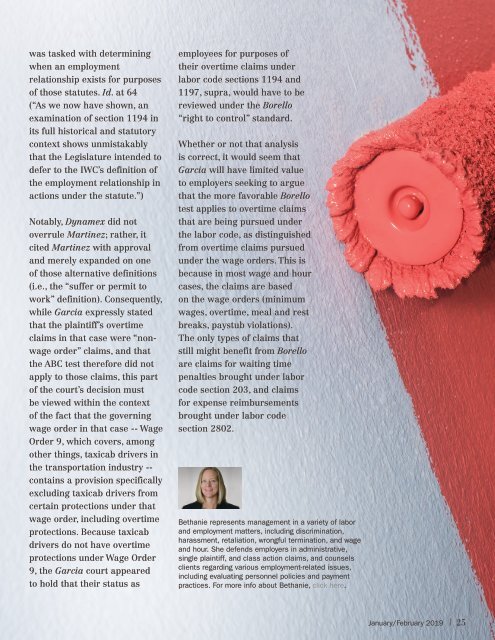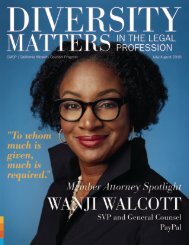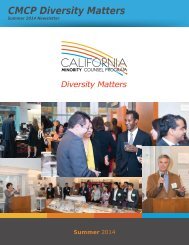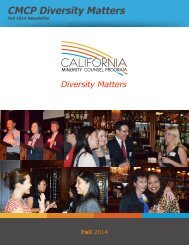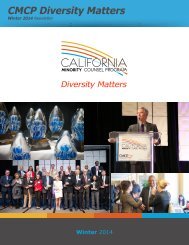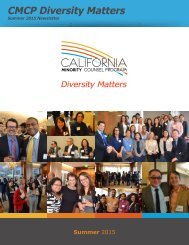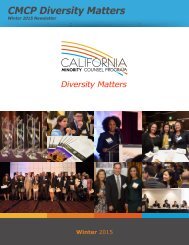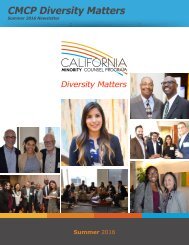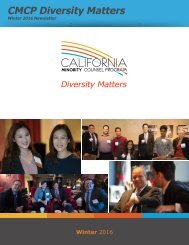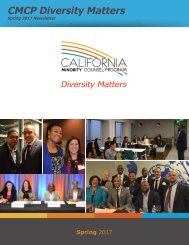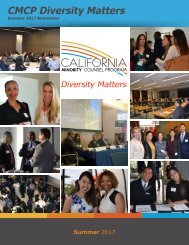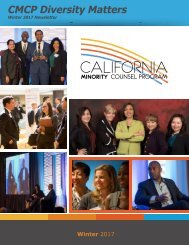CMCP Diversity Matters - January/February 2019
California Minority Counsel Program Diversity Matters - January/February 2018
California Minority Counsel Program Diversity Matters - January/February 2018
You also want an ePaper? Increase the reach of your titles
YUMPU automatically turns print PDFs into web optimized ePapers that Google loves.
was tasked with determining<br />
when an employment<br />
relationship exists for purposes<br />
of those statutes. Id. at 64<br />
(“As we now have shown, an<br />
examination of section 1194 in<br />
its full historical and statutory<br />
context shows unmistakably<br />
that the Legislature intended to<br />
defer to the IWC’s definition of<br />
the employment relationship in<br />
actions under the statute.”)<br />
Notably, Dynamex did not<br />
overrule Martinez; rather, it<br />
cited Martinez with approval<br />
and merely expanded on one<br />
of those alternative definitions<br />
(i.e., the “suffer or permit to<br />
work” definition). Consequently,<br />
while Garcia expressly stated<br />
that the plaintiff’s overtime<br />
claims in that case were “nonwage<br />
order” claims, and that<br />
the ABC test therefore did not<br />
apply to those claims, this part<br />
of the court’s decision must<br />
be viewed within the context<br />
of the fact that the governing<br />
wage order in that case -- Wage<br />
Order 9, which covers, among<br />
other things, taxicab drivers in<br />
the transportation industry --<br />
contains a provision specifically<br />
excluding taxicab drivers from<br />
certain protections under that<br />
wage order, including overtime<br />
protections. Because taxicab<br />
drivers do not have overtime<br />
protections under Wage Order<br />
9, the Garcia court appeared<br />
to hold that their status as<br />
employees for purposes of<br />
their overtime claims under<br />
labor code sections 1194 and<br />
1197, supra, would have to be<br />
reviewed under the Borello<br />
“right to control” standard.<br />
Whether or not that analysis<br />
is correct, it would seem that<br />
Garcia will have limited value<br />
to employers seeking to argue<br />
that the more favorable Borello<br />
test applies to overtime claims<br />
that are being pursued under<br />
the labor code, as distinguished<br />
from overtime claims pursued<br />
under the wage orders. This is<br />
because in most wage and hour<br />
cases, the claims are based<br />
on the wage orders (minimum<br />
wages, overtime, meal and rest<br />
breaks, paystub violations).<br />
The only types of claims that<br />
still might benefit from Borello<br />
are claims for waiting time<br />
penalties brought under labor<br />
code section 203, and claims<br />
for expense reimbursements<br />
brought under labor code<br />
section 2802.<br />
Bethanie represents management in a variety of labor<br />
and employment matters, including discrimination,<br />
harassment, retaliation, wrongful termination, and wage<br />
and hour. She defends employers in administrative,<br />
single plaintiff, and class action claims, and counsels<br />
clients regarding various employment-related issues,<br />
including evaluating personnel policies and payment<br />
practices. For more info about Bethanie, click here.<br />
<strong>January</strong>/<strong>February</strong> <strong>2019</strong> | 25


